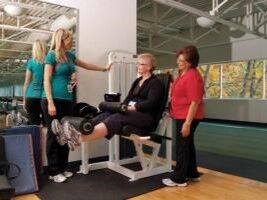Leadership
Psychosocial Guidance for Women’s Chronic Disease Management
International societies release guidelines on cardiac rehabilitation for women.
Posted August 31, 2022 Reviewed by Kaja Perina
Key points
- Women are more often distressed from chronic conditions than men, and this distress reduces their quality and quantity of life.
- They are also more likely to experience depression and anxiety as a result of chronic problems.
- Now experts recommend women access disease management programs with comprehensive psychosocial assessment and treatment.
This post was co-authored by Sherry Grace and Robyn Gallagher.
Chronic diseases are common in women and men as they age, but women have poorer quality of life. Women are also more likely to be hospitalized, for longer, and are more likely to die around the time of a health event such as a heart attack. Clearly, women need more support through chronic disease management programs, such as cardiac rehabilitation. Indeed, women who attend these programs may experience greater gains than men. Despite these benefits, women access these programs much less often, and when they do, they often do not complete them.
To address these persistent issues for women, a leading umbrella organization, the International Council of Cardiovascular Prevention and Rehabilitation (with which Dr. Gallagher and I are both involved), recently released a guideline on how to tailor these disease management programs to women to better engage them and improve their health outcomes. One of the main recommendations is to assess and address women’s psychosocial issues. The guideline was endorsed by 24 clinical societies from around the world, who are working together to implement these important recommendations.
Psychosocial needs of women with chronic diseases
As we discussed in a previous post, women with chronic diseases suffer from depression as well as anxiety more than men. Women’s more frequent adverse childhood experiences and intimate partner violence contribute to poorer chronic disease outcomes. Women are often of lower socioeconomic status than men due to sexism in society, rendering it more difficult for women to engage in healthy living and access health care.

Moreover, gaining support can be more complex and difficult for women. For instance, they may experience marital strain due to unequal relationships or social isolation due to widowhood (e.g., heterosexual women often marry older men). These issues put women at increased risk of having even more health problems, ultimately lowering their quantity of life.
Women have multiple roles, often serving as informal caregivers to family members. They often put this caregiving ahead of their disease self-care, including attending rehabilitation programs. For instance, one patient told me she could not come to our rehabilitation program at the time offered because that was when she made her husband’s lunch and got her grandkids to school. This is unfortunate because by not attending, she may not be around as long to provide this care to her loved ones.
Cardiac rehabilitation with a major psychosocial component is key for women
Chronic disease management programs such as cardiac rehabilitation offer patients one-stop shopping to support them in coping and making the lifestyle changes needed to return to quality living. On average, patients go to hour-long sessions three times a week for three months. They receive education on their condition, diet, and the medications they need to take, as well as a structured exercise program.
Most centrally for women, these programs have a psychosocial component. Recent research shows rehabilitation programs with a strong psychosocial component result in lower death overall and better quality of life for women. Ideally these programs should be staffed by regulated health care professionals trained in psychology and women’s health to deliver this effectively.
Until now, there had not been guidance on how to tailor these chronic disease management programs to address women’s unique and more preponderant needs. The recently-published guideline, in which we were involved, specifies that all aspects of a women’s psychosocial health should be assessed (see above factors) and then identified issues addressed using evidence-based treatments.
Depression treatment is addressed in another post, and treatment of anxiety similarly involves psychotherapy and/or medication; exercise plays an important supportive role. Cardiac rehabilitation participation itself is shown to increase social support. Women get support from the inter-professional team, as well as through interacting with other patients who are going through similar experiences. For example, many women go for coffee together after their sessions and continue to exercise together after completing their program.
Final thoughts
Unfortunately, there are not many chronic disease programs tailored to women that are available currently. Hopefully, this will change as policymakers implement these new recommendations. In the meantime, if you have a chronic condition, be sure to ask your primary care provider for a referral to a disease management program. Once there, make sure your psychosocial well-being is comprehensively assessed, and ask about the psychological component of the program. Your heart and mind will both thank you.
Robyn Gallagher is a Professor of Nursing at the University of Sydney and Chair of the International Council of Cardiovascular Prevention and Rehabilitation.
References
Ghisi, G.LM., Marzolini, S., Price, J., Beckie, T., Mamataz, T., Naheed, A., & Grace, S.L. (2022). Women-focused cardiovascular rehabilitation: An International Council of Cardiovascular Prevention and Rehabilitation Clinical Practice Guideline. Canadian Journal of Cardiology.
Turk-Adawi, K., Supervia, M., Lopez-Jimenez, F., Adawi, A., Sadeghi, M., & Grace, S.L. (2021). Women-only cardiac rehabilitation delivery around the globe. Heart, Lung & Circulation; 30(1):135-143.
Mamataz, T., Ghisi, G.L.M., Pakosh, M., & Grace, S.L. (2022). Outcomes of women-focused cardiac rehabilitation: A systematic review and meta-analysis. Maturitas:160;32-60.
Mamataz, T., Ghisi, G.L.M., Pakosh, M., & Grace, S.L. (2021). Nature, availability and utilization of women-focused cardiac rehabilitation: A systematic review. BMC Cardiovascular Disorders;21:459.
Chung, S., Candelaria, D., & Gallagher, R. (2022). Women’s health-related quality of life substantially improves with tailored cardiac rehabilitation: A systematic review and meta-analysis. Journal of Cardiopulmonary Rehabilitation and Prevention. https://pubmed.ncbi.nlm.nih.gov/35703271/
Gallagher, R., Marshall, A., Fisher. M., & Elliott, D. (2008). On my own; experiences of recovery from acute coronary syndrome for women living alone. Heart Lung;37(6):417-424.
Clayton, C., Motley, C., & Sakakibara, B. (2019). Enhancing social support among people with cardiovascular disease: A systematic scoping review. Current Cardiology Reports,21:123.




